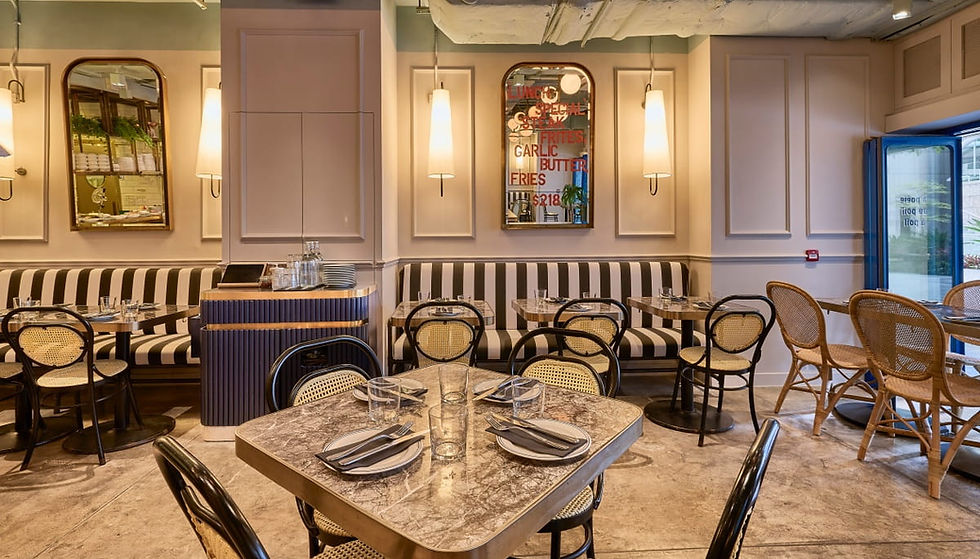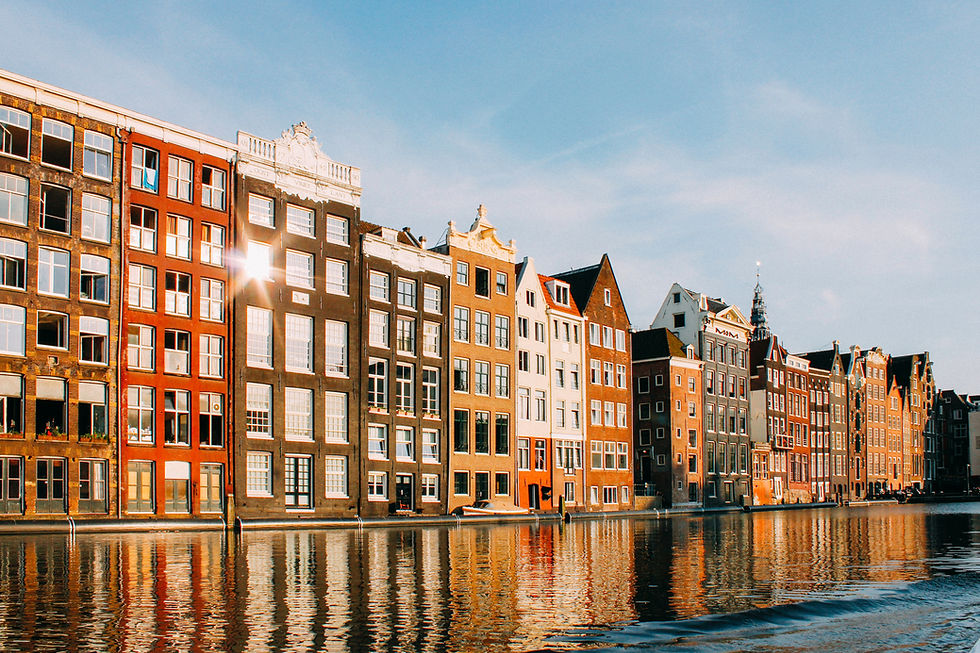Chef Andrew Wong of London's A. Wong On Culinary Anthropology & Chinese Heritage in Cooking
- Sasha Huang

- Feb 24, 2023
- 5 min read
INTERVIEW

Paying tribute to 2,000 years of diverse Chinese culinary history, A. Wong, chef Andrew Wong's eponymous two-Michelin-starred restaurant, takes dining experiences to new highs in a refined, contemporary setting.
Growing up in London as a descendant of Chinese refugees and restaurant owners, Wong held on to his childhood as he had always dreamt big of pursuing a life and career in the culinary world.
While he started out by studying chemistry at Oxford University and then social anthropology at the London School of Economics, he had a spark of inspiration at 22, and returned to his Chinese roots by exploring its incredible heritage – and the artful techniques behind the cuisine. He embarked on an enlightening tour of China, taking into account its beautiful, rich history and culture, thereby capitating chef Wong's curiosity. It was at this moment that chef Wong would dedicate his time to researching and honouring Chinese gastronomy in his contemporary cooking.

His exploration never stopped, however, and took a brilliant turn when he met a food anthropologist and graduate of Chinese and Indian History in 2014 – Dr Mukta Das. Together, the two continued to study the culture and impact of the Silk Route in the culinary world.
In 2012, he chose to open A. Wong in the same Pimlico venue of what used to be his parents' restaurant back years before in 1985. The 'A' in A. Wong, therefore, is not just emblematic for Andrew but also of his parents Albert and Annie. Today, the restaurant serves a delectable menu of gourmet dishes that celebrate Chinese cuisine from the traditional sharing culture to the myriad of flavours. In observing and experimenting with cooking techniques and ingredients, chef Wong redefines contemporary Chinese fine dining in London. Here, he shares with us his stories and philosophies.

1. What is your culinary philosophy and how does it influence your craft?
My cooking philosophy is about celebrating China’s diversity and evolution over several thousand years across multiple borders. I want to celebrate the craft and technique developed through my cooking. It’s tapping into food in its broader cultural sense. How is flavour perceived, how do you achieve balance, and what does it mean when we talk about yin and yang in food?

2. Can you talk a little bit about how you have combined your passion for cooking with academic studies of chemistry and social anthropology?
I’ve been working with Dr Mukta Das for about five years now. It’s a real privilege and one I don’t take lightly. We introspectively look at the cuisine in terms of flavour, technique, balance, and cultural etiquette. I think all of this – taste, cultural, and social, affects our perception of the dining experience and taste.
Mukta’s approach is from a historical point of view, looking at all sorts of economic and social aspects behind whatever dish we are researching. I look at it from a chef’s perspective, what it will taste like, what the texture would be, and how I can logistically make this happen.
We do a lot of research to ensure that the base flavour profiles are nearly identical to historical and technical Chinese techniques. But at the same time, I like to think that our food is quite explorative, in the sense that we don’t specify that our food comes from a particular region or style. I want people to take an interest in the flavours of a dish. I want to try and encourage people to go out and explore other Chinese restaurants that they may not have done before. This opens us up to criticism, but if what we are serving isn’t deemed “authentic”, that’s ok because it’s not supposed to be.

'I want people to take an interest in the flavours of a dish. I want to try and encourage people to go out and explore other Chinese restaurants that they may not have done before. This opens us up to criticism, but if what we are serving isn’t deemed “authentic”, that’s ok because it’s not supposed to be.'

3. What do you wish to bring to London’s dining scene?
We celebrate techniques, some very old and some more modern. We draw on the vast array of ingredients from the Chinese kitchen – fermented, dried, and salty, with vegetables, seafood and meat to create a balanced and harmonious dining experience.
The cuisine also reflects our time and London location. Some of it comes from my own interaction with being Chinese and being born in the UK, and it's also a celebration of my heritage and the importance of that.

4. As an official member at Research Associate at SOAS Food Studies Centre, which aspects of food inspire and motivate your work?
Because of my background in anthropology, I interact with food as if were a cultural phenomenon. For me, the idea of humans as social beings is essential. This means that when you talk about running a restaurant, it's about more than just the food. It's also about how humans interact in a space, with each other and with the experience.
It's an understanding that we are social beings and like to communicate. We want to taste, see, and touch, which is very important for a restaurant. Restaurants are not just about food; interaction with the space and concept is integral.
Food is not just flavour; it is an expression of history, location, ingredients and choices. In trying to travel through and learn the experience of the chefs who have come before, we can try and bring this knowledge to the present. Whether it be a bird’s nest, fermented radishes, salted fish, or fermented black beans, sometimes these techniques are not celebrated enough in the Chinese kitchen. They are typical to us but not to the rest of the world.

5. What is your creative process when crafting and experimenting with new ideas?
It varies; sometimes, I’ll ask Dr Mukta Das (the food anthropologist I work with) to look into something specific, like pastry, or she will share a poem or new research that interests me.
We don't attempt to replicate dishes exactly; it's more of an inspiration and springboard for coming up with new ideas. These can be flavour combinations that are sometimes based on poetry we've read, Chinese traditional medicine or anecdotes from historical figures throughout history. We like to look at different parts of the Chinese kitchen – dim sum, roasting and try to find combinations of flavours that celebrate moments in time.
'Food is not just flavour; it is an expression of history, location, ingredients and choices.'

6. A. Wong is the first Chinese restaurant outside of Asia to be awarded two Michelin stars. How has this impacted your notion of Chinese culinary representation in London?
It’s important to know I didn’t win; Michelin stars are awarded. It’s lovely and nice to get recognition, but it doesn’t make you better or worse than any other Chinese restaurant. We do what we do; we spend a lot of time in the kitchen, and we try to entertain ourselves and create interesting flavour combinations and dishes.

7. How would you describe the dining experience at A. Wong?
Fun, unpretentious, explorative, inquisitive, researched, and a celebration of culture, still keeping up with modern ways while keeping our techniques and cooking methods traditional.
I like to think it’s everything I love about London; it’s cosmopolitan, moving, embracing, and multicultural.
---
All imagery is provided by Lotus International.
Address: 70 Wilton Rd, Pimlico, London SW1V 1DE, United Kingdom | Website: awong.co.uk | Phone: +44 20 7828 8931 | Email: info@awong.co.uk | Instagram: @a.wong_londonuk | Twitter: @awongSW1
.png)









Comments